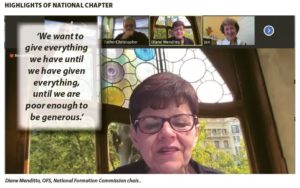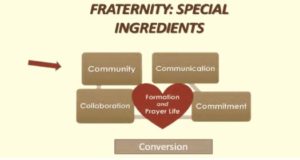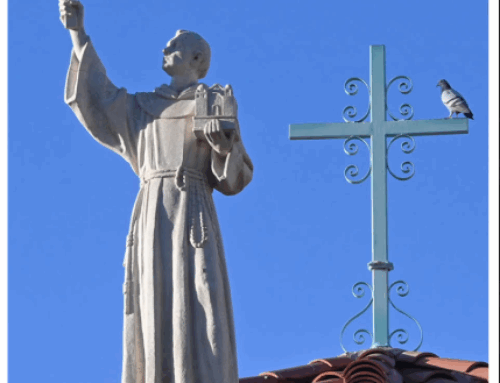(This article original appeared in the Winter 2021 TAU-USA Issue 102)
 By SHARON WINZELER, OFS
By SHARON WINZELER, OFS
Calling the local fraternity the “heartbeat of the order,” National Formation Commission Chair Diane Menditto, OFS, pointed to the commitment Secular Franciscans make at profession “to accompany and take care of one another on our journey to the Father.”
In her presentation titled “Fraternity: Our Way of Life,” Menditto elaborated on five key elements to living in communion with one another — collaboration, community, communication, commitment, and conversion.
While explaining the art of Franciscan collaboration, she cited a report by former Minister General Emanuela DeNunzio, OFS, that represents the identity of Secular Franciscans in a triple dimension: Personal (inner life); Fraternal (co-responsibility); and Universal (the mission).
“The mission itself needs to be reflected not only in Gospel values, but in order to work for the fraternity, it also needs to be based on the gifts of its members,” Menditto said.
By championing the lives of our brothers and sisters in fraternity, we strengthen each other, she said, citing the General Constitutions, Article 30.2 on how fraternity should be lived.
“The sense of co-responsibility of the members requires personal presence, witness, prayer and active collaboration in accordance with each one’s situation and possible obligations for the animation of the fraternity,” Menditto said.
The challenge of the community element means the “acceptance of and empathy for our brothers and sisters,” she said.
“We can go out and support others because we know we are loved and supported,” she said.
“We are not looking for others to serve us, but we are looking for ways to serve one another. We want to give everything we have until we have given everything, until we are poor enough to be generous.”
The communication element means listening with patience and humility, even when one doesn’t agree. Menditto encouraged regional ministers and councilors to communicate directly with the local fraternities they represent.
“This is one of the ways the local fraternities will know that we are listening to them,” she said. Listening as a method of communication applies to every level of fraternity.
 “If we truly want to serve one another and others in fraternity, listening to the needs of others should, no must, be the basis for whatever we do for one another,” Menditto said.
“If we truly want to serve one another and others in fraternity, listening to the needs of others should, no must, be the basis for whatever we do for one another,” Menditto said.
The fourth challenge of a Secular Franciscan is commitment to what one promised at profession.
“By profession we are committed to God, to one another and to all creation. This is called universal kinship.”
Living the Gospel life as a Secular Franciscan is a full-time experience, she said.
Finally, the biggest challenge of all is daily conversion.
“It is the only way we will accomplish the rest,” Menditto said, citing Article 7 of the Rule: “United by their vocation as brothers and sisters of penance, and motivated by the dynamic power of the gospel, let them conform their thoughts and deeds to those of Christ by means of that radical interior change which the Gospel itself calls conversion.”
Daily conversion helps us to strengthen our mission outlined in the Gospel.
“This requires constant self-examination to be sure we reach out to others because we are not attached to ourselves.”
Using extensive quotes from “Belonging to the SFO” by Emanuela DeNunzio, OFS, (General Chapter 2008), Menditto recommended that fraternities:
- create a School of sanctity — “Fraternity can promote in its members full development of the interior life: an intense liturgical life, sacramental and charitable life through practices such as fraternity prayer, Mass, Liturgy of the Hours, retreats and days of recollection.”
- create a School of formation — “The spirit of belonging is nurtured when the Rule becomes the life of the brothers and sisters. It will assure a kind of assimilation of the spirit of the Rule in the life and in the history of each person. Those who are assiduous readers of the writings of Francis and of Clare and of the ancient biographies will be strengthened in their Franciscan identity. Therefore, Secular Franciscans should regularly read spiritual readings from the sources. We are agents of our own formation. We form ourselves so that we can form others.”
- be a Witness of ecclesial communion — “It is essential that everyone make the decision to make himself/herself present in the lives of the brothers and sisters: rejoicing with those who participate, being mindful of those that do not come, trying to find the reasons for which someone has lost the motivation. In order to promote the desire to gather in fraternity, the Council should plan meetings that are pleasant, productive and enriching.”
- participate in the apostolic purpose of the Church — “The Rule recommends being creative in our apostolic activity — examine our ministries. Society has changed, and the Church has renewed itself and is renewing itself again. The Gospel is always the same, but new approaches and new encounters with the Gospel and history are necessary.”
- be a Presence in society — “In light of the social doctrine of the church, every fraternity should question its priorities in its own missionary commitment.”
- ••
RECOMMENDED RESOURCES
“The Secular Franciscan Order for an
Evangelizing Mission Together with all the Franciscan Family.” (Benedetto Lino, OFS, at the First International Congress for Missions and Evangelization-OFM-2014)
“How Should An Order Like the OFS Be
Managed at All Its Levels?” (Benedetto Lino,
OFS, XIV General Chapter, November 2014)
“Belonging to the SFO” (Emanuela DeNunzio, OFS, General Chapter 2008)


Leave A Comment